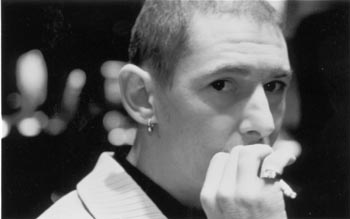![[Metroactive Movies]](/movies/gifs/movies468.gif)
[ Movies Index | Show Times | San Jose | Metroactive Central | Archives ]
 Welcome to Hard Times: Ian Hart plays an unmarried father with a short attention span in 'Wonderland.' Cockney Magnolia London's calling is travail and toil for an unhappy family in 'Wonderland' MICHAEL WINTERBOTTOM defends his title as England's most depressing filmmaker with his newest, Wonderland. Amusingly, the director of such movies as Jude, Butterfly Kiss, Go Now and Welcome to Sarajevo considers Wonderland a lighter film than usual. He's still laying it on with a trowel, but this time his visual style is different: he's using blown-up Super16, with natural light and ambient sound. The film gives an illusion of reality TV, but the strong hand of coincidence and a reached-for happy ending blow that illusion. In the murky November light of a long Guy Fawkes weekend (England's combination of Halloween and the Fourth of July), Winterbottom sets out to record the travails of an unhappy family in their separate homes throughout London. There are three daughters: Debbie (Shirley Henderson), a single mom playing the field; Nadia (Gina McKee), a cafe waitress searching the singles ads for something stable, and Molly (Molly Parker), about to have a child. Their parents are old, still married but feuding bitterly. We also have one father-to-be, terrified by the imminent blessed event and fearful of being trapped in a job selling plumbing fixtures; and one irresponsible, unmarried father (Ian Hart) of a single boy. The boy himself, left to wander alone through video arcades, is a numb adult in the making. The cast is near indistinguishable in the half-light, and because there are so many of them, we spend a good part of the film asking, "Is that the woman who's looking for a date or the pregnant one?" Eventually, Henderson's slaggy, backbiting hairdresser becomes the one to watch. Henderson was fantastic in Mike Leigh's Topsy-Turvy, as the wicked black-haired girl with the dry, even voice and the needle habit. And here she has venom--she won't be crushed by this film's thesis that all are crushed by London. By contrast, Parker, who's usually a lot of fun, is given an enormously long, grisly childbirth scene. Screenwriter Laurence Coriat, like P.T. Anderson before him, is drawing on Robert Altman's Short Cuts. The failure of the imitations (both in Anderson's Magnolia and in this Cockney version) is clearly the lack of the strong personalities Altman's stars provided, as well as the lack of Raymond Carver's Chekhovian turn of events, which led Short Cuts to a series of revelations. In Wonderland, the mood is static. This is the new version of the old British working-class film, without the grand bitter performances actors like Laurence Olivier, Richard Burton or Albert Finney brought to the protest films, and without hope of any political change. Wonderland states baldly: These people will live in these hideous South London apartment buildings chain-smoking cigarettes forever, struggling through life without any hope more beautiful than a love affair or an occasional street carnival. Strangely, the vistas of London are the most tantalizing part of Wonderland. The shots of the hovering dome of St. Paul and the lively streets at night are treated with more affection than the characters. The city is more interesting than the citizens--proof of the essential narcissism and lack of compassion in Winterbottom's murderously grim filmmaking.
Wonderland (Unrated; 108 min.), directed by Michael Winterbottom, written by Laurence Coriat, photographed by Sean Bobbitt and starring Shirley Henderson, Gina McKee and Molly Parker, opens Friday at the Towne Theater in San Jose. [ San Jose | Metroactive Central | Archives ]
|
From the October 12-18, 2000 issue of Metro, Silicon Valley's Weekly Newspaper.
Copyright © 2000 Metro Publishing Inc. Metroactive is affiliated with the Boulevards Network.
For more information about the San Jose/Silicon Valley area, visit sanjose.com.